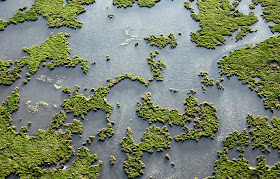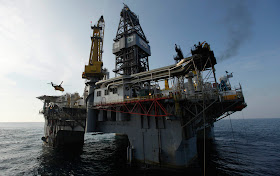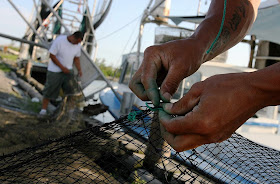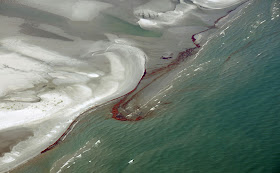
Seawater covered with thick black oil splashes up in brown-stained whitecaps off the side of the supply vessel Joe Griffin at the site of the Deepwater Horizon oil spill containment efforts in the Gulf of Mexico off the coast of Louisiana Sunday, May 9, 2010. (AP Photo/Gerald Herbert)

A tugboat moves through the oil slick on May 6, 2010 in the Gulf of Mexico. (Michael B. Watkins/U.S. Navy via Getty Images) #

Oil burns during a controlled fire May 6, 2010 in the Gulf of Mexico. The U.S. Coast Guard is overseeing oil burns after the sinking, and subsequent massive oil leak, from the sinking of the Deepwater Horizon oil platform off the coast of Louisiana. (Justin E. Stumberg/U.S. Navy via Getty Images)

Dark clouds of smoke and fire emerge as oil burns during a controlled fire in the Gulf of Mexico, May 6, 2010. The U.S. Coast Guard working in partnership with BP PLC, local residents, and other federal agencies conducted the "in situ burn" to aid in preventing the spread of oil. (REUTERS/Mass Communication Specialist 2nd Class Justin Stumberg-US Navy)

A pod of Bottlenose dolphins swim under the oily water Chandeleur Sound, Louisiana, Thursday, May 6, 2010 in the Gulf of Mexico. (AP Photo/Alex Brandon)

Winds cause ripples to form on the water of grassy marsh wetlands in St. Bernard Parish, Louisiana, as work continues to try to protect it from the massive oil spill on May 9, 2010 in Gulf of Mexico. (Joe Raedle/Getty Images)

An oil-stained cattle egret rests on the deck of the supply vessel Joe Griffin at the site of the Deepwater Horizon oil spill containment efforts in the Gulf of Mexico off the coast of Louisiana, Sunday, May 9, 2010. (AP Photo/Gerald Herbert)

Oily water is seen off the side of the Joe Griffin supply vessel at the site of the Deepwater Horizon oil spill containment efforts in the Gulf of Mexico on Saturday, May 8, 2010. (AP Photo/Gerald Herbert)

A helicopter takes off from the helipad of the Development Driller III, which is drilling the relief well at the site of the Deepwater Horizon oil spill, in the Gulf of Mexico on May 11, 2010. (REUTERS/Gerald Herbert)

15 One of the New harbor Islands is protected by two oil booms against the oil slick that has passed inside of the protective barrier formed by the Chandeleur Islands, as cleanup operations continue for the BP Deepwater Horizon platform disaster off Louisiana, on May 10, 2010. (MARK RALSTON/AFP/Getty Images)

Blobs of oil from the massive spill float on the surface of the water on May 5, 2010 in Breton and Chandeleur sounds off the coast of Louisiana. (Joe Raedle/Getty Images)

Captain Johnny Bourgeois and deckhand Chris Crappel (left) of Venice, Louisiana retie netting for shrimp trawling as they wait for the shrimp season to reopen in Venice, Louisiana May 9, 2010. Louisiana Department of Wildlife and Fisheries (LDWF) Secretary Robert Barham announced that the shrimp season in the territorial seas of the central coast of Louisiana from Four Bayou Pass to Freshwater Bayou were closed effective sunset Saturday. (REUTERS/Sean Gardner)

Louisiana National Guard Private Dallas Bacon guides a dump truck as they use dirt to create an earthen barrier as they try to protect an estuary from the massive oil spill on May 10, 2010 in Lafourche Parish, Louisiana. (Joe Raedle/Getty Images)

Louisiana National Guardsmen use Blackhawk helicopters to build a dam to protect the fragile wetlands known locally as "Bayou" near the town of Grand Isle, as work continues to protect the coastline from oil after the BP Deepwater Horizon platform disaster off Louisiana, on May 11, 2010. (MARK RALSTON/AFP/Getty)

Oil from the Deepwater Horizon oil spill makes its way to shore on Chandeleur Islands in Louisiana on May 7, 2010. (AP Photo/The Dallas Morning News, Vernon Bryant)

An aerial view of the northern Chandeleur barrier islands shows sheens of oil reaching land, Thursday, May 6, 2010 in the Gulf of Mexico. The islands rest 20 miles from the main Louisiana coastline. (AP Photo/David Quinn)

This image provided by NASA shows the Mississippi Delta (top right) and the growing oil slick in the Gulf of Mexico on May 5, 2010. Photo was taken by International Space Station Expedition 23 flight engineer Soichi Noguchi. (AP Photo/NASA - Soichi Noguchi)

Shrimp boats are used to collect oil with booms in the waters of Chandeleur Sound, Louisiana, Wednesday, May 5, 2010. (AP Photo/Eric Gay)

An oil soaked bird struggles against the oil slicked side of the HOS Iron Horse supply vessel at the site of the Deepwater Horizon oil spill in the Gulf of Mexico off the coast of Louisiana Sunday, May 9, 2010. (AP Photo/Gerald Herbert)
all photos:
© 2010 NY Times Co.
Amidst the flurry of finger-pointing, with harsh vitriol being doled out to BP, to Obama, to NOAA, I'd like us to remember that anyone reading this is complicit in this crime against our Mother and home.
Thanks to the Boston Globe and the NY Times group for making this witness available.
PS: I don't quite know how to say this but... beautiful photographs of tragedy are in themselves a paradox and irony. Perhaps amateur photos would in an sense convey the tragedy more explicitly.
Certainly the gulf disaster is a wake up call to us all, and especially points a finger towards a return to fishing under sail.
Yes, it is a tragedy. Yes, we are all complicit by our use of energy.
ReplyDeleteNo, we won't be going back to the romantic age of sail.
A little perspective.
1) We would not be drilling 5000 feet below the surface, stretching the limits of man's knowledge and technology had not the environmentalist lobby driven oil producers that far offshore. There are huge, vast, humongous resources on land and much closer to shore where drilling is safer. We're that far out because the environmentalists pushed us that far out. They are complicit, perhaps even more so than the average person.
2) While there is a lot of hyperbole in the news about this being the greatest, biggest, worst spill ever, the real facts are that it is still 1/6th the size of the 1979 IXTOC-1 spill in the gulf in 1979, and 1/20th the size of the Gulf War intentional spills in Iraq. source: http://sppiblog.org/news/past-oil-spills
We survived those. We'll survive this one too ... and will learn from it.
Off course it is the environmental lobby that is responsible for this oil spill. Certainly not the lack of safety standards, or putting corporate profits above all else, or preserving our ability to drive big, inefficient cars when ever and where ever we want.
ReplyDeleteAnd comparing this US spill to the worst spills in history in order to minimize and rationalize it is quite sad.
It seems that there was a time when the US would have looked at the need for new and innovative energy sources as a challenge to overcome. Now we just make excuses.
Wish I could convey my feelings upon reading this post. The photos are diverse both geographical and in content. Well done.
ReplyDeleteBob, you sound like you are marketing something. This is a word for word copy of your comment on
ReplyDeletehttp://odock.blogspot.com/
Have you no shame?
The greens would have us use less oil. I suppose that's bad too?
ReplyDeleteBP boss Tony Heywood doesn't seem like the kind of fella one would want for a friend or a neighbour. And no doubt he'll get a big payoff and maybe a government job shortly...
Give me a break. Environmentalists didn't want them to drill off-shore, any more than on-shore! We want sensible alternatives, and we're willing to pay more for them. When the oil men start making less money, we'll be getting somewhere. Im not sure how a sailor or kayaker can NOT be and environmentalist. I'm happy to see Eva Too in the water, Bob, nice clean water. Let's hope it stays that way.
ReplyDeleteThis disaster strikes close to my heart as I spent nearly two years running a crew boat in the Kerr McGee oil field in Breton Sound. We actually lived on Breton Island and took the men out daily to service the hundreds of wells located there. It was a fantastic area and the fishing was out of this world. Speckled sea trout, redfish, Spanish mackerel.
ReplyDeleteCoupled with Katrina, this is almost like the last nail in the coffin for Louisiana.